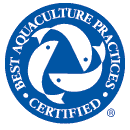Certification & Quality Control
Marine Stewardship Council (MSC) - http://www.msc.org
When you see the MSC ecolabel, you can be sure that the seafood bearing the label comes from a certified sustainable fishery. It is the MSC standards that define the performance needed for fisheries to be certified as sustainable and for businesses to trade in certified seafood.
The MSC has 2 standards, for sustainable fishing and seafood traceability. Fisheries and seafood businesses voluntarily seek certification against the relevant standards, which meet the world's best practice guidelines for certification and ecolabelling.
MSC environmental standard for sustainable fishing
Fisheries can demonstrate that their practices are sustainable and access market benefits by getting certified to the MSC standard for sustainable fishing.
MSC chain of custody standard for seafood traceability
When seafood is sold with the MSC ecolabel every business in the supply chain must have undertaken a detailed traceability audit against the MSC Chain of Custody standard. This ensures that only seafood from a certified sustainable fishery is sold with the MSC label.
Third party certification
Assessments against both MSC standards are carried out by independently accredited certifiers. The MSC's "third-party" approach ensures our certification and ecolabelling program is robust, credible and meets best practice guidelines.
 The MSC is committed to being the world's leading certification program for sustainable wild-capture seafood. We seek to deliver a robust, effective and accessible certification program that keeps up with the latest scientific knowledge and industry practices.
The MSC is committed to being the world's leading certification program for sustainable wild-capture seafood. We seek to deliver a robust, effective and accessible certification program that keeps up with the latest scientific knowledge and industry practices.
How we meet best practice
The MSC program enables consumers and seafood buyers around the world to make the best environmental choice in seafood. Underpinned by best practice guidelines for ecolabelling and certification, we follow international, professional benchmarks to promote robust processes and uphold our values of independence, transparency, impartiality and stakeholder consultation.
Global Aquaculture Alliance (GAA) - http://gaalliance.org
Feeding the World Through Responsible Aquaculture
Global Aquaculture Alliance is the leading international organization dedicated to advancing environmentally and socially responsible aquaculture and a safe supply of seafood to meet growing world food needs.
About GAA
Organized in 1997, the non-profit NGO develops the Best Aquaculture Practices certification standards and encourages the use of responsible aquaculture practices. GAA also works to improve production and marketing efficiencies, and promote effective, coordinated regulatory and trade policies.
About BAP
To promote responsible practices across the aquaculture industry, the Global Aquaculture Alliance coordinates the development of Best Aquaculture Practices (BAP) certification standards for hatcheries, farms, processing facilities and feed mills.
The BAP program drives continued improvements via high standards that deliver significant benefits industrywide
The BAP standards currently cover aquaculture facilities for shrimp, tilapia, channel catfish and Pangasius. Additional standards for salmon farms are under development.
BAP Standards
 The Best Aquaculture Practices (BAP) standards address environmental and social responsibility, animal welfare, food safety and traceability in a voluntary certification program for aquaculture facilities. BAP certification defines the most important elements of responsible aquaculture and provides quantitative guidelines by which to evaluate adherence to those practices.
The Best Aquaculture Practices (BAP) standards address environmental and social responsibility, animal welfare, food safety and traceability in a voluntary certification program for aquaculture facilities. BAP certification defines the most important elements of responsible aquaculture and provides quantitative guidelines by which to evaluate adherence to those practices.
The BAP program outlines standards for each type of facility, from hatchery and feed mill to farm to processing plant. It currently certifies shrimp farms and hatcheries; tilapia, channel catfish and Pangasius farms; seafood processing plants and feed mills.
Drafted by technical committees with broad stakeholder representation and overseen by a Standards Oversight Committee, the BAP standards are more comprehensive than other certification systems. Although individual standards vary by facility type, all BAP standards address community and employee relations, conservation of biodiversity, soil and water management, and drug and chemical management.


